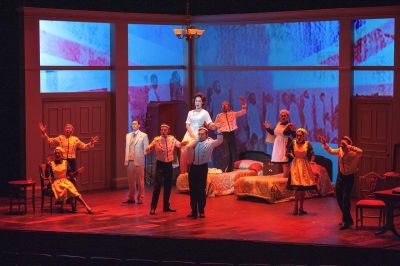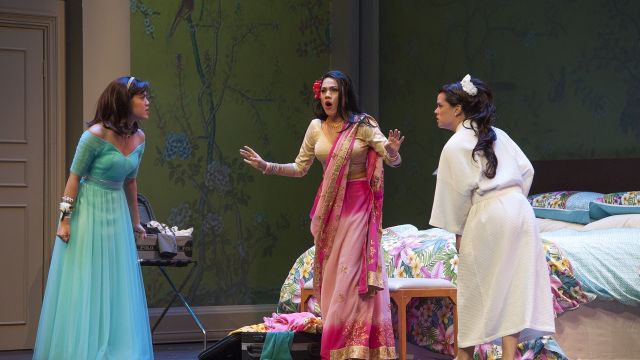Hotel
Comedy, pathos, singing and dancing, with more than just a touch of history, all meld together seamlessly to make the masterpiece that is Hotel.
Set in the iconic hotel Raffles, Hotel traces the history of Singapore between 1915 and 2015 in 11 episodes or scenes.
At 5 hours, Hotel is played in 2 parts – Part 1 contains 6 scenes (1915 to 1965) and Part 2 contains 5 scenes (1975 to 2015).
I must confess this reviewer thought 5 hours would be a marathon, but far from it. The 2 parts of the play seem to race by due to many factors - clever set design, multiple costume changes, actors multi-tasking taking many roles, singing, dancing and an extremely clever script that has you laughing one minute and shedding a tear the next.
There is so much talent to discuss in the making of this play, but I don’t have enough space so I will concentrate on the main aspects.
 Firstly the script, written by Alfian Sa’at and Marcia Vanderstratten, which successfully bridges the gap between east and west. There are multiple languages in Hotel - English, Mandarin, Cantonese, Malay and Japanese to name a few, but the subtlety of the language is never lost thanks to surtitles and skilled portrayals by the actors.
Firstly the script, written by Alfian Sa’at and Marcia Vanderstratten, which successfully bridges the gap between east and west. There are multiple languages in Hotel - English, Mandarin, Cantonese, Malay and Japanese to name a few, but the subtlety of the language is never lost thanks to surtitles and skilled portrayals by the actors.
Secondly, the directors Ivan Heng and Glen Goei. The balance of the production is outstanding with actors effortlessly changing characters and every production detail just right. Heng is also one of the cast members and provides a poignant portrayal of a husband who has come back to the Raffles to die. What could have been a depressing scene is triumphant and provides a fitting conclusion to a memorable evening’s entertainment.
Credit must also go to the rest of the cast – Brendon Fernandez, Ghafir Akbar, Sharda Harrison, Daniel Jenkins, Jo Kukathas, Dwayne Lau, Lee Chee Keng, Moo Siew Keh, Pam Oei, Siti, Khalijah Zainal, Julie Wee, Yap Yi Kai and Lina Yu. They portray so many characters it is difficult at times to determine who is who. Some of my favourites are the Indian psychic, the Chinese grandmother and of course, the 2 lady-boys from Bugis Street.
I was extremely impressed by the ability of the actors to master other languages. I attended the production with my partner who is Chinese-Malay and was assured that the accents are consistent and well handled.
 The bridging of time is effectively handled by the cast (plus a couple of stage hands dressed appropriately). A back lit set serves to change the wallpaper to match each decade and also acts as a social comment to mark the important parts of Singapore’s history. The set pieces are also cleverly changed by the cast, often accompanied by singing and dancing.
The bridging of time is effectively handled by the cast (plus a couple of stage hands dressed appropriately). A back lit set serves to change the wallpaper to match each decade and also acts as a social comment to mark the important parts of Singapore’s history. The set pieces are also cleverly changed by the cast, often accompanied by singing and dancing.
I have mentioned several of my favourite sections but there are many others - the English plantation owner that embodies the British Raj, the Japanese captain that has to tell his wife distressing news that will change their lives, the producer of a ‘realistic’ film that becomes anything but, the lady-boys who meet a very drunk US army veteran and the infamous sari that causes wedding confrontations between Chinese and Indian families.
My only complaint is the season of Hotel is just not long enough. This production deserves to be seen by a larger audience.
This is the first time this production has been seen outside Singapore and I hope it is not the last we see of Wild Rice.
Barry Hill
Images supplied by Wild Rice.
Subscribe to our E-Newsletter, buy our latest print edition or find a Performing Arts book at Book Nook.

